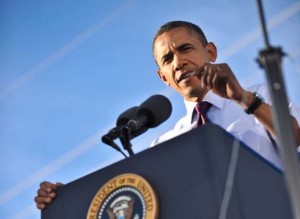
President Barack Obama looking to expand funding the investigations arm of the National Highway Traffic Safety Administration.
The more than doubling of the previous record for automotive recalls last year – 60 million-plus vehicles – was the result of someone taking a stand and now legislation aimed at protecting future whistleblowers has passed the U.S. Senate and is awaiting a vote in the House.
The Motor Vehicle Safety Whistleblower Act, which was first proposed in November, permits incentives for whistleblowers – in the millions of dollars – if they reveal dangerous products or practices by automakers.
The bill allows the U.S. transportation secretary discretion to award up to 30% of the total monetary penalties resulting from Department of Transportation or Justice Department enforcement actions that total more than $1 million. The bill covers employees or contractors of motor vehicle manufacturers, parts suppliers and dealerships.
In short, if an automaker is fined the current maximum of $35 million, the whistleblower could be awarded $10.5 million.
“This bill provides important incentives for whistle-blowers in the auto industry to bring safety concerns to the attention of federal regulators when harmful safety defects are not reported,” said Senate Commerce chairman John Thune, R-S.D.
“While laws and regulations currently provide certain penalties for unaddressed safety failures, this legislation seeks to help identify and stop problems before anyone is killed or seriously injured.”
(Feds push for new laws to speed recalls, raise fines. For more, Click Here.)
The bill, which is now before the House awaiting a vote, covers “original information.” In short, the whistleblowers need to provide information to federal officials that they did not already know about a defect, reporting violation or some form of non-compliance that could cause a “risk of death or serious injury.”
(Click Here for details Ford’s recall of nearly 600K vehicles.)
The bill is modeled on existing statutory whistleblower protections for individuals that share information with the Internal Revenue Service and the Securities and Exchange Commission. It’s part of a concerted effort to improve the enforcement of capability of the National Highway Traffic Safety Administration.
(To see how motorists make it easier for thieves to steal cars, Click Here.)
The Obama Administration has proposed tripling NHTSA’s budget for defects detection budget and doubling its staff while increasing the amount automakers can be fined 10-fold from $35 million to $350 million for violations.

This is a case of bad economics IMO. Do we really need to pay someone a million dollars let alone ten million dollars to report a safety defect? If so where did their morals and ethics go?
With the recent NHTSA fines and recalls I doubt we need a knee-jerk reaction to safety defects. A moderate increase in NHTSA’s budget may be in order but I’m still wondering where the reported $8/per car NHTSA tax went to that was suppose to be imposed years ago???
More NHTSA investigators may be useful up to a point. With the auto makers now aware of the ramifications both legal and financial for product safety defects, it appears they have gotten the “memo” and are acting proactively to address past and current safety issues – for the most part.
I still don’t understand how BMW has been allowed to NOT recall all of the X35i models sold with defective high fuel pressure fuel pumps that cause the vehicle to just shut off at speed and leave the driver helpless including with no power steering assist. NHTSA has this issue on their website as a documented safety defect and accidents have been reported so why BMW has not been required to properly replace the fuel system in these cars, which are still on the highways, is unknown.
To me this is a clear failure on NHTSA’s part, especially after 20/20 or whomever it was did a TV special on this serious safety issue in all X35i powered BMW models. BMW has never resolved these fuel pump failures. All that BMW did was agree to extend the warranty. A warranty doesn’t prevent an accident waiting to happen. These extended warranty agreements with NHTSA are basically a cop out by NHTSA for failure to force a proper safety recall and repair of these BMW vehicles.